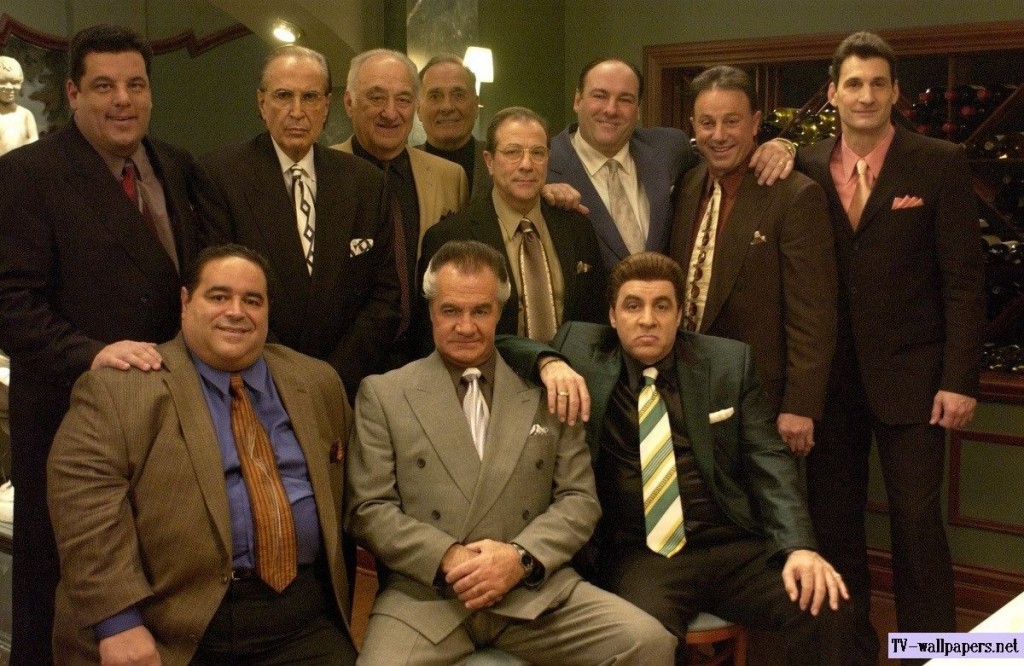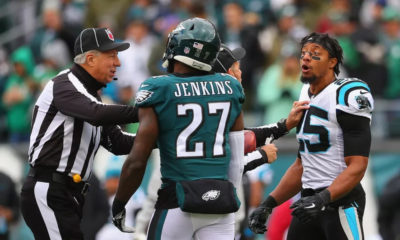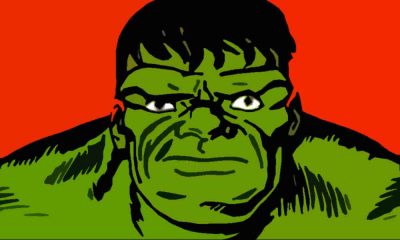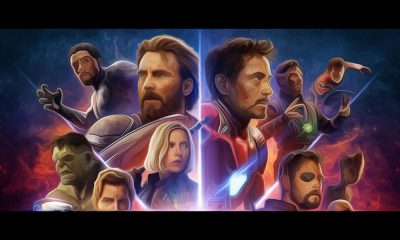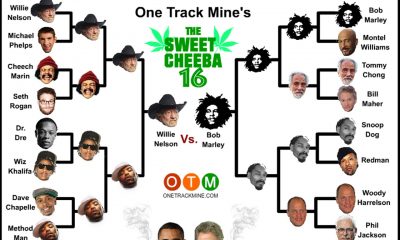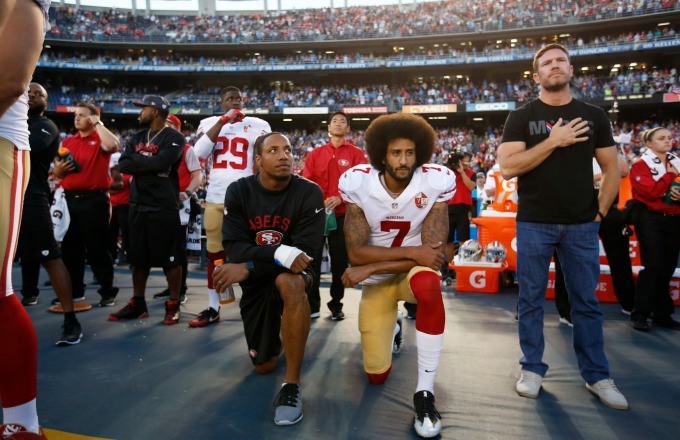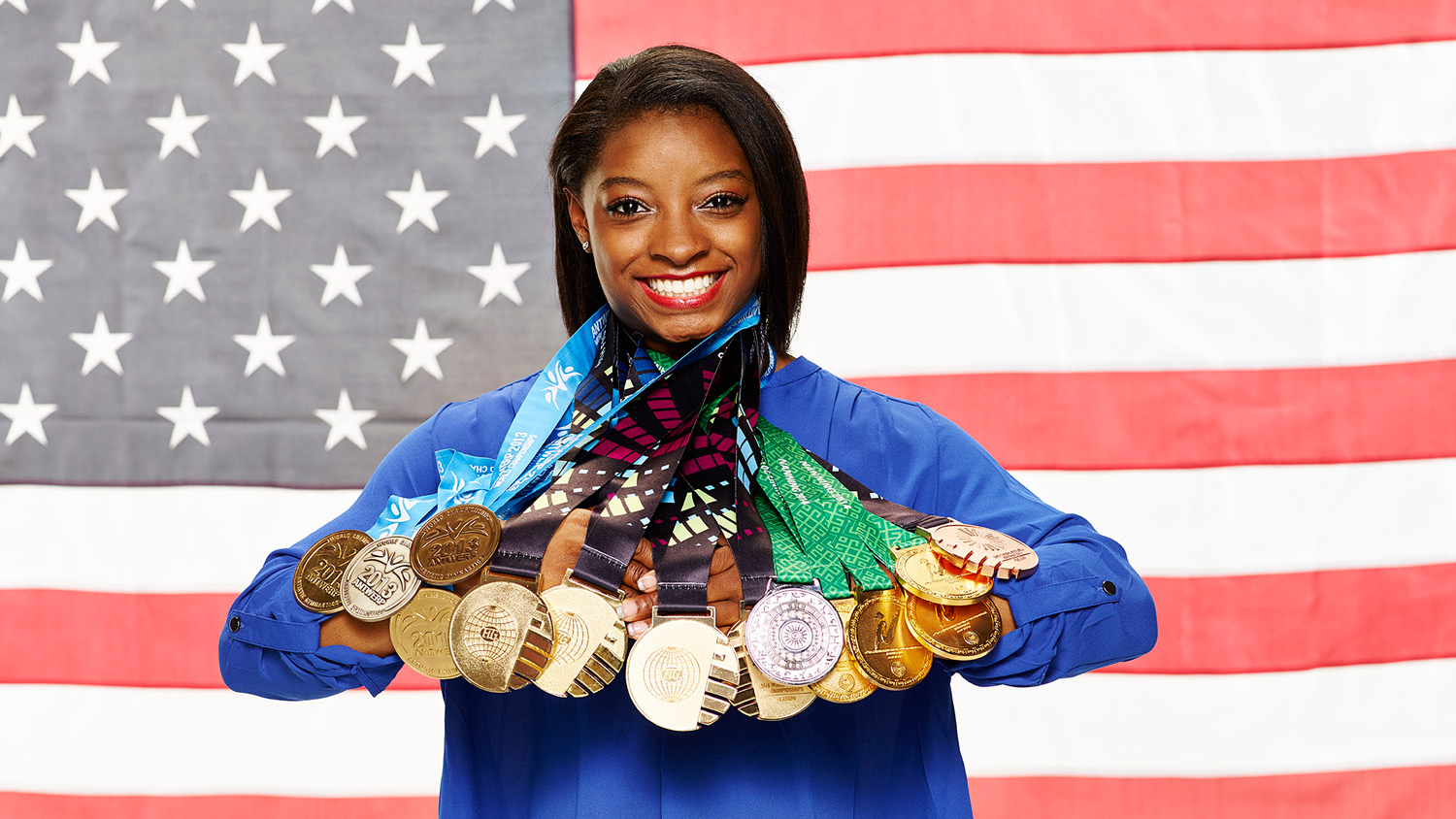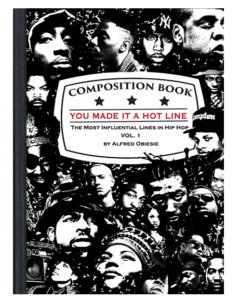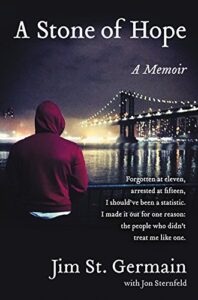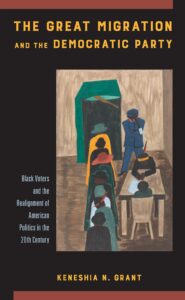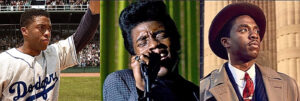Entertainment
Did Superbowl XLIX Confirm the Status Quo in America?
Published
9 years agoon
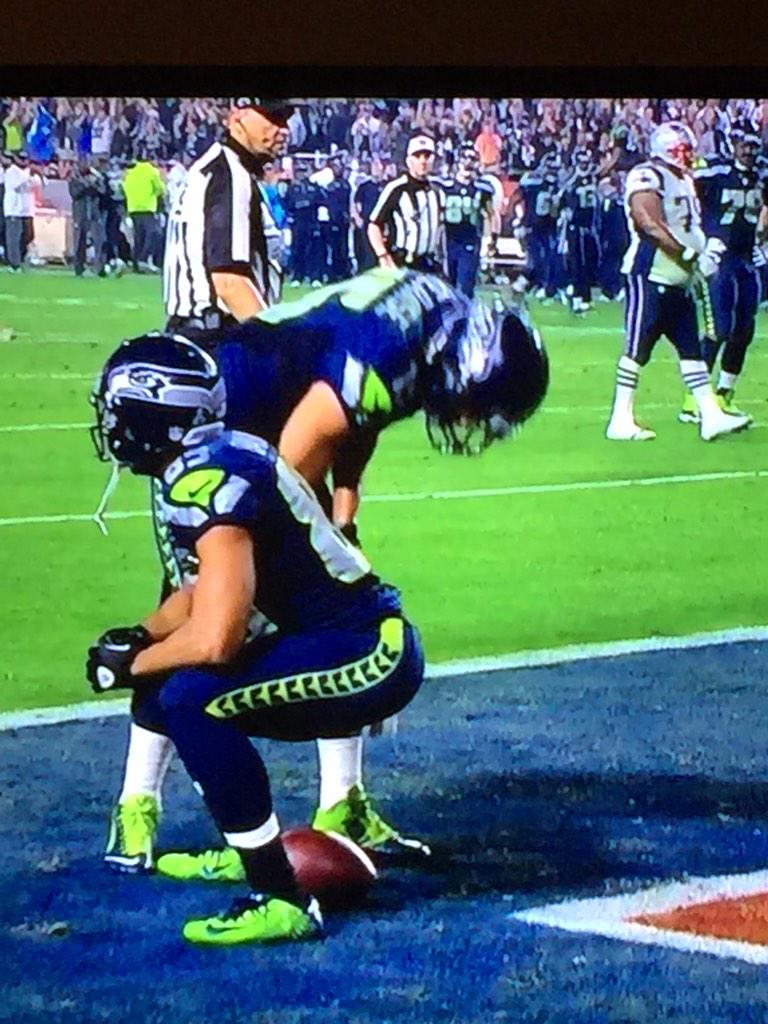
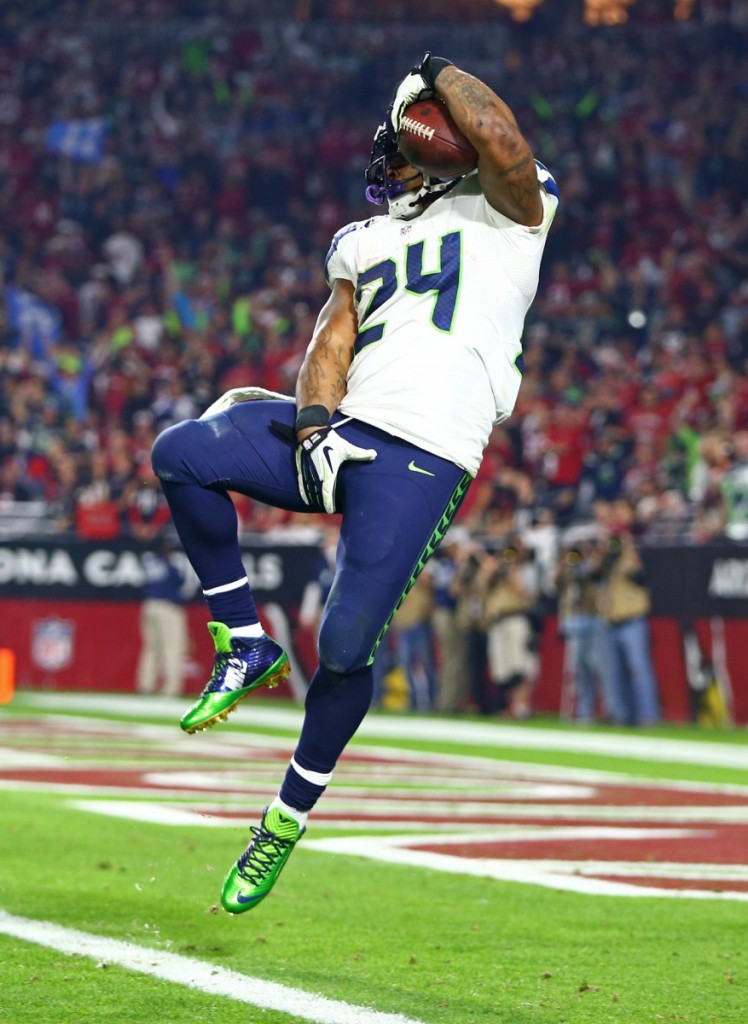 I am still reeling from last night’s Superbowl. Never mind the sad-ass commercials, sexy vixens on giant kittens, and exorbitant pageantry. Never mind the weeks of underlying theatrics, interviews (and lack thereof) and squishy ball scandals (#deflategate #beastmode.) Never mind the ridiculous catches followed by the ridiculous decisions (Really Pete? The most dominant rusher since Walter or Barry and you throw on the one yard line!?!?) To add further fuel to these potential I.E.Ds (Improperly Exploited Deflations), I got to thinking; was there also a confirmation of America’s status quo in Superbowl XLIX?
I am still reeling from last night’s Superbowl. Never mind the sad-ass commercials, sexy vixens on giant kittens, and exorbitant pageantry. Never mind the weeks of underlying theatrics, interviews (and lack thereof) and squishy ball scandals (#deflategate #beastmode.) Never mind the ridiculous catches followed by the ridiculous decisions (Really Pete? The most dominant rusher since Walter or Barry and you throw on the one yard line!?!?) To add further fuel to these potential I.E.Ds (Improperly Exploited Deflations), I got to thinking; was there also a confirmation of America’s status quo in Superbowl XLIX?
The Seattle Seahawks are reminiscent of the defiant University of Miami Hurricanes dynasty teams of the early 80’’s and 90’s in that they are mostly urban, unapologetically outspoken, and amazingly talented young players. Also like the Hurricanes, the mainstream wishes they would just shut up and play football (until the mainstream gets bored and wants an interview.)
All Pro cornerback Richard Sherman’s infamous off-field press conferences are second only to all Pro Running back Marshawn Lynch’s infamous lack of off-field press conferences (“I’m only here so I won’t get fined.”) The establishment (the NFL) also does not appreciate their on-field antics. Whether trash talking opposing wide-receivers or grabbing a different set of soggy balls after every miraculous touchdown run, the Seahawks image is befitting of another family the NFL also prefer not represent their family friendly establishment (Uncle Petey “Bad Calls” Carrolls sends his regards.)
The New England Patriots, owned by cheese baron Robert (“Thurston Howell III”) Kraft represent everything the NFL could possibly hope for. Led by Captain America a.k.a Tom (“My baby momma and wife are supermodels”) Brady, America’s grumpy uncle Bill (“busting your balls”) Billichek and America’s favorite frat boy Rob (“Gronk want football”) Gronkowski, the organization’s presumed persona reeks of all that is right with America… and that’s where the problem begins.
The ahem “clean cut” Patriots have been caught cheating on multiple occasions. Their faces may be clean but their hands are certainly dirty. This is not to say that other NFL teams don’t also bend the rules or cheat to some extent. This is to say that the Patriots keep getting caught stealing signals, deflating balls and engaging in other random acts of dishonesty. This begs the question (and in parallel to American history); just how much of this success was earned and how much should we attribute to unscrupulous means? Can the 2 types of successes even be unraveled?
There was a strange phenomenon I had never before witnessed at a Superbowl gathering. Everyone was rooting for the Seahawks. Not one single person was cheering for the opposing team. a.k.a the Patriots. Could it be because, although from the Northeast, we were lifelong NY Giants fans? Could it be we were sick of seeing the same team win over and over again? Could it be the Patriots had cheated and had an air of arrogance about them? Could it also be they were indicative of success by guys who often resemble Abecrombie and Fitch models? Judging by some of the comments on social media, I would say a component of all these are true;
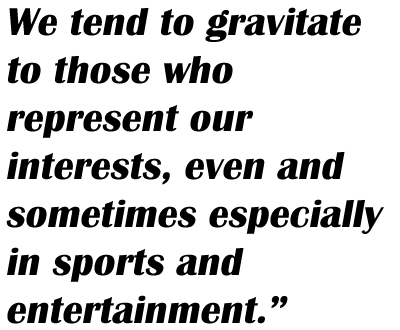 DA: “if they gave him the ball, he would have scored and been MVP…..then the NFL would have to deal with him not talking after the game…#conspiracytheoristsunite
DA: “if they gave him the ball, he would have scored and been MVP…..then the NFL would have to deal with him not talking after the game…#conspiracytheoristsunite
FY: The ball should have been given to Lynch. A hall of fame running back should be given the opportunity in that position. Point blank! #ConspiracyTheoristHere #NoWayThatMakesSense
To pretend the game is all about the sport and discount the players and their background is disingenuous. We tend to gravitate to those who represent our interests, even and sometimes especially in sports and entertainment. The pretty boy quarterback (either one) riding off into the sunset in the Disney mobile is a more welcome site than Marshawn massaging his man berries. Not welcome however is wondering if the champions are truly the champions and if they actually earned it? Much more disheartening is wondering if trying to project an image of winning may trump actual winning?
SideBar: I’m still feeling sick! It’s been 24 hours and I haven’t recovered. The last time I felt like this on a Sunday, the Lannisters were directly responsible. Hopefully there will be some Purple Wedding redemption next season. His name is BEASTMODE FOR GOD SAKES!!! BEAST MODE!! GIVE HIM THE BALL!! Oy friggin’ Vey!! Sidebar complete.
You may like
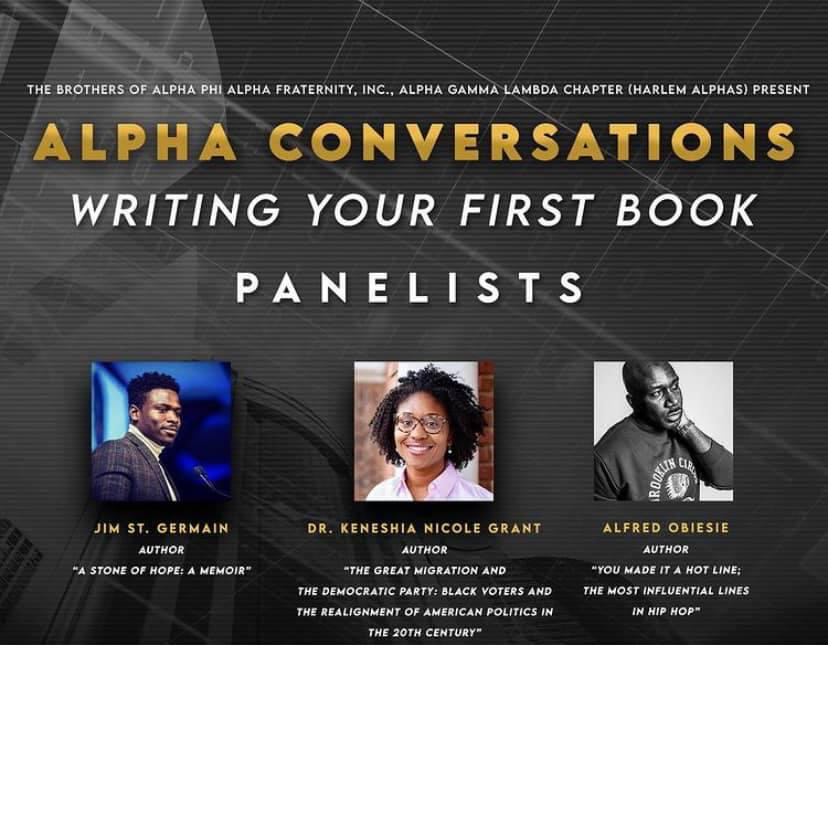
I had the distinct pleasure of participating in a panel discussion on writing your first book, presented by the Harlem chapter of Alpha Phi Alpha Fraternity Inc. Alongside Jim St. Germain, Author – A Stone of Hope: A Memoir and Dr. Keneshia Nicole Grant, Author – The Great Migration and the Democratic Party: Black Voters and the Realignment of American Politics in the 20th Century. We opined on pain points, benefits and strategies regarding our inaugural voyages into authorship. Feel free to watch for your self and I hope this provides some insight to all those looking to make the same voyage. Enjoy!
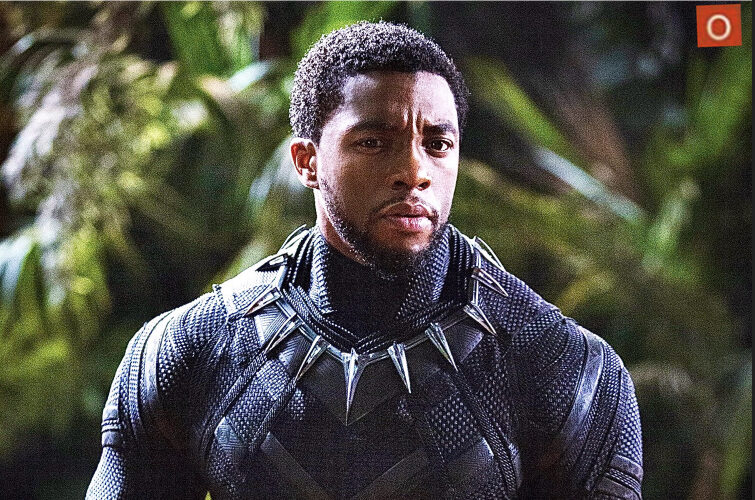
It is clear that Chadwick Boseman chose iconic roles like Thurgood Marshall, James Brown, Jackie Robinson and Black Panther with deliberate intent and for a specific purpose. In an age where positive roles for Black actors is often sparse, Chadwick managed to land and portray historical figures that made most respect his talents if not revel in his ability to transition effortlessly for one character to another. Even I had to give his African accent a solid B+ (It’s the highest grade the Nigerian Standards Bureau can give for an African accent to a non African FYI.)
Holding out and preparing for these dynamic roles came with both great frustration and incredible resolve I’m certain. Not to mention the taxing ordeal of battling Colon Cancer as the grueling scheduling of filming and increasing responsibility for positive representation loomed. Even under extreme duress, Chadwick’s commitment to others appeared to outweigh his own tribulations, unbeknownst to us all.
Black Panther may have been just a movie to some and that may be because some can easily rattle off 10 movies with a king of non Af-Am origin. It represented a lot more to others. Albeit imagined, imagery on cinema often accomplishes more to augment the social narrative and society itself than actual reality. If negative stereotypes influence perception then positive ones absolutely have the same converse effect.
Even in jest, the cultural misappropriation of raisins in potato salad on SNL skits directly spoke to the tampering of black culture to which T’challa championed, represented and aptly responded “Oh hell Nah Karen!”
If you don’t understand the relevance of representation, it’s probably because you are thoroughly represented. After all, no one is ever grateful for every breath they take until they are gasping for air.
R.I.P Chadwick Boseman. Thank you for breathing life into the possibility of Black excellence.
Article
10 Easter Eggs of Segregation in Lovecraft Country Episode 1
Published
4 years agoon
August 19, 2020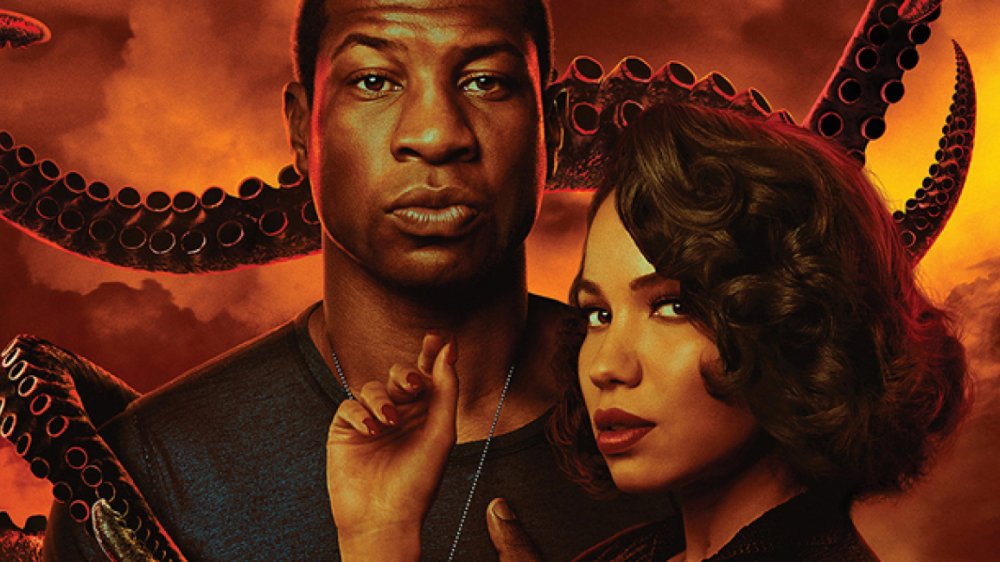
We’re all familiar with movies hiding easter eggs throughout their films sending winks and nods to pop-culture references. Sometimes it will be a tip-of-the-cap to an author, actor, or creator. Sometimes it is paying homage to an inspiring series, book, or film that’s near and dear to the director’s heart. This week I’ve seen a first. A T.V. series that has several easter eggs depicting segregation and oppression that only eagle-eyed aficionado’s of the black struggle might have caught on to.
Lovecraft Country is littered with important details that would fly over many people’s heads, and as I watched it again, I caught more nods to the true oppression of many African-Americans during the post-World War II era.
As a film buff, nothing makes me happier than watching a review, breakdown, or hidden easter egg video on a TV show I enjoy. Yesterday I did the same with Lovecraft Country, and while many of the melanin-deficient reviewers on youtube touched on the themes of literature, horror, and fantasy, many understandably missed some of the most important historical references.
Here are 10 Easter Eggs of Segregation in Lovecraft Country Episode 1.
1. H.P. Lovecraft’s little poem.
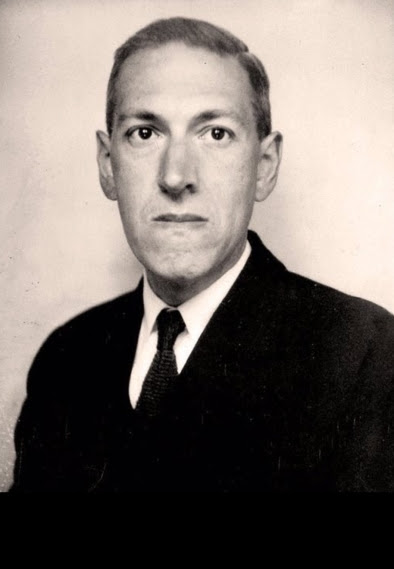
While we all know H.P. Lovecraft as an innovator of modern horror, fiction, and fantasy in literature, many people (including myself) didn’t know about a poem he wrote that spoke horribly about African Americans. Lovecraft Country alludes to the poem, but never recites it. Once they mentioned the title, I went straight to my Google Search. Below is the poem called: On the Creation of N*****s (1912)
When, long ago, the gods created Earth
In Jove’s fair image Man was shaped at birth.
The beasts for lesser parts were next designed;
Yet were they too remote from humankind.
To fill the gap, and join the rest to Man,
Th’Olympian host conceived a clever plan.
A beast they wrought, in semi-human figure,
Filled it with vice, and called the thing a N****r.
I’m sure Jackie Robinson beating the S**T out of Cthulhu at the beginning of the episode was a collective middle finger from the black community to Mr. Lovecraft.
2. Seating for Black People
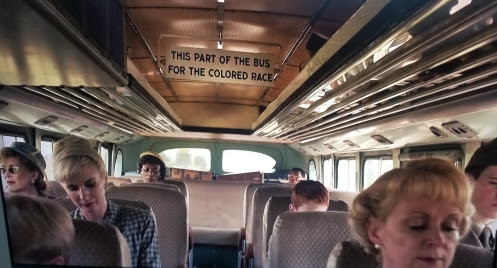
Scene from episode 1
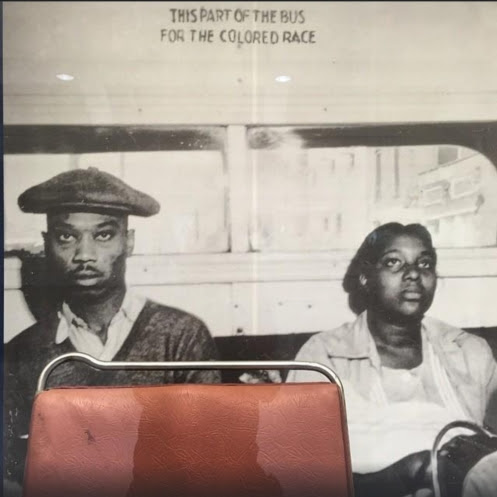
Actual photo of a segregated bus
While this may not come as a surprise to many of you, a lot of people are ignorant to the fact that, yes, black people were made to sit in the back of the bus. Many know the story of Rosa Parks’ defining moment, but for decades this was the way of life for black people. Where insult to injury is predicated in the show is when the bus breaks down and the bus driver gets a local pick-up truck driver to ride the stranded passengers into the city. Immediately in the next scene, the only two black passengers were seen walking down the road into Chicago.
3. Propaganda for the Negro Soldier
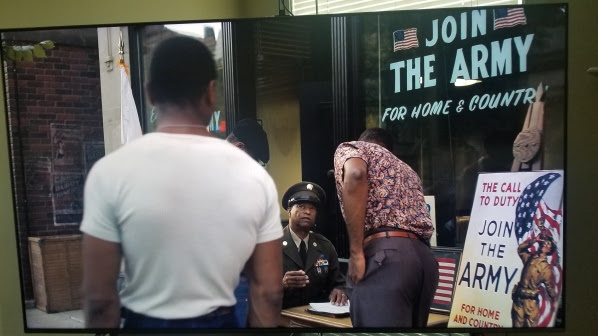

In Lovecraft Country, the above poster is not shown in this episode, but instead, it’s a black soldier telling other young black men that if they enlist, they can see the world. While Atticus walks by the soldier, there’s a glance of recognition as if Atticus was once one of those impressionable young men, and he knows their being lied to. Black men had to be enticed to enlist by different methods than whites because it was hard to show patriotism to a country that still to that day had kept them oppressed. So, they would show a poster of Joe Louis joining the fight…why don’t you? Get to see the world! Little did they know seeing the world would involve PTSD, death, and despair.
4. The Negro Motorist Greenbook
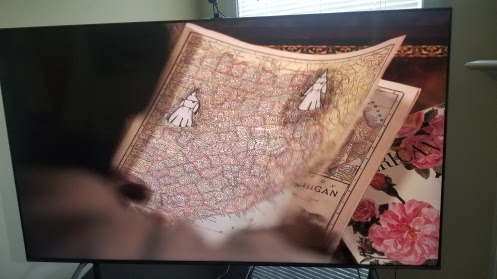
Scene from episode 1 depiction of the Green-Book
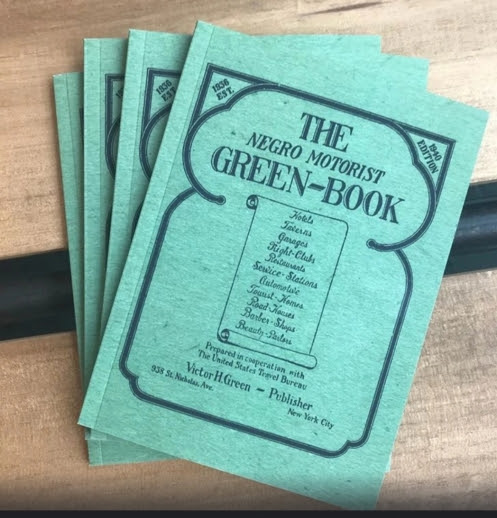
Actual Green-Book
The synopsis according to IMDB.com is: “Lovecraft Country follows Atticus Black as he joins up with his friend Letitia and his Uncle George to embark on a road trip across 1950s Jim Crow America in search of his missing father.” While this is true, it’s not the whole story. Why are they embarking on this trip? It’s to help update what many people may know as, The Negro Motorist Greenbook. Yup, just like the movie, The Greenbook. If you don’t know, this book was originated by Victor Hugo Green as a travel bible for African Americans. It provided details of safe roads to travel, places for food, repairs, and lodging where they wouldn’t be turned away or even worse, assaulted.
5. James Baldwin’s monologue on racial divide
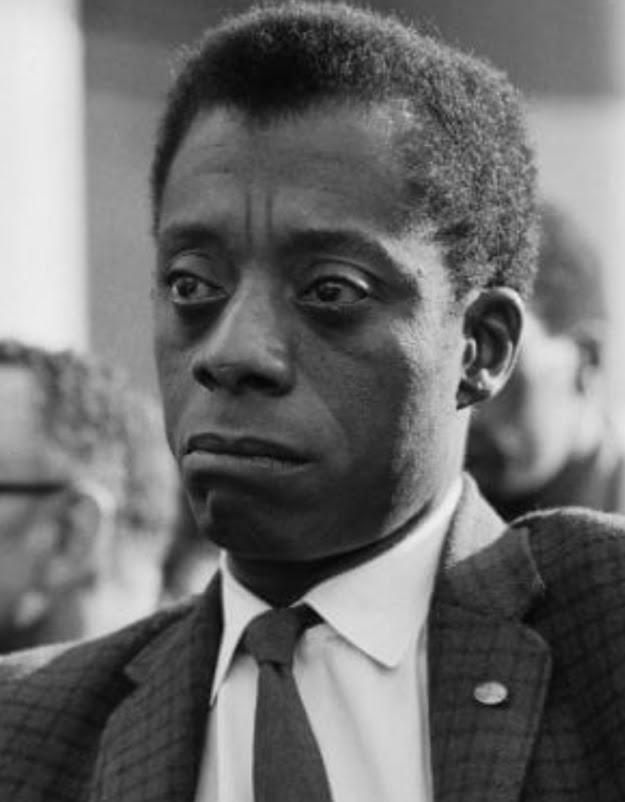
During one of the scenes in Lovecraft Country, we see a montage of our protagonist’s road trip. In the montage we see different moments where they face discrimination, others facing discrimination, and the hardships of ignorant people with all the privilege in the world monopolizing on their entitlements. Usually, during movie montages, a composer would play a score to envoke emotions during the collection of scenes. Lovecraft Country went in a different direction. Instead, they played the monologue of James Baldwin’s renowned speech at Cambridge University where he debated with William Buckley on the subject of the United States racial divide. James Baldwin was a brilliant playwright, novelist, speaker, and activist that eloquently described the plight of the black man as it still stands today. Merged with the scenes during the montage, it speaks volumes about the state of America.
6. Ice Cream stand Scene
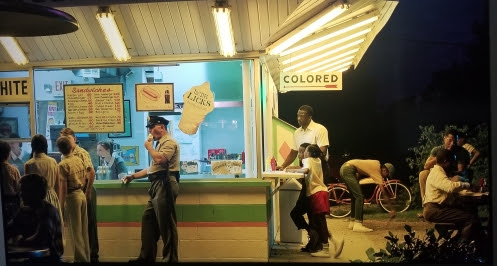
Scene from episode 1
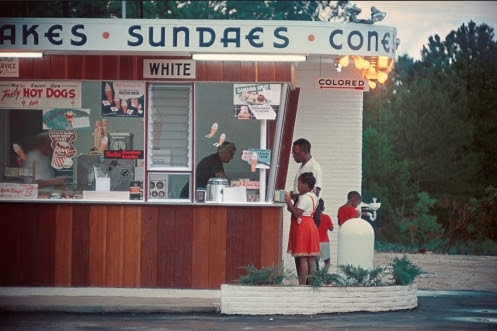
Gordon Sparks photograph
In one of the scenes in the montage, we see a black man and his children waiting at an ice cream stand for service. Right over them is a sign that says “colored” and on the other side of the stand is a group of white people with ice cream being tended to by the servers. This scene looked extremely familiar to me. When I did some research, I realized this scene was based on a famous photograph by Gordon Parks, photographer and journalist who well-documented scenes of the segregation and civil rights era. Years ago I saw his work in its full brilliant quality at the High Museum in Atlanta. The color and detail brought a realism that a black-and-white photo could never do. It made this a real thing.
7. Mother and daughter under the neon sign
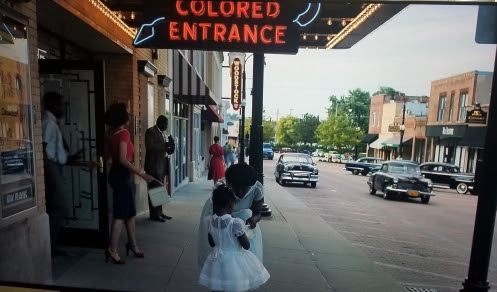
Scene from episode 1
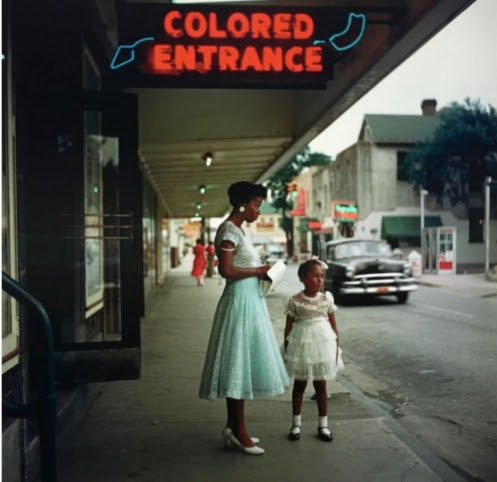
Actual photo
This scene once again pays homage to another photograph by Gordon Parks. A mother and her daughter dressed elegantly as if they were going to church, standing under a large neon sign that says ‘Colored Entrance’.
8. The billboard across from the gas station
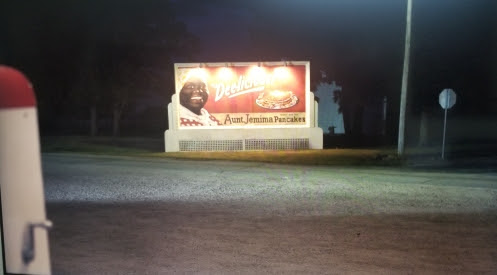
Scene from episode 1
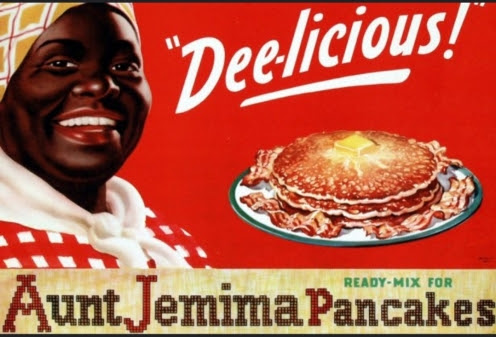
Advertisement the billboard is based on
While Atticus and company are at a gas station filling up their car, they are approached by a gas station attendant pretending to be a gorilla to mock them. Leticia holds Atticus back from approaching the man as the attendant intensifies his ignorant behavior and she forces Atticus into the car. As they pull off, you can see a Billboard for Aunt Jemima in the background. Aunt Jemima has always been a misrepresentation of black culture through the lens of the white man and advertised to his fellow man as the overall perception of black people. The image of Aunt Jemima is a source reflection of the learned behavior of the gas station attendant.
9. Sundown towns
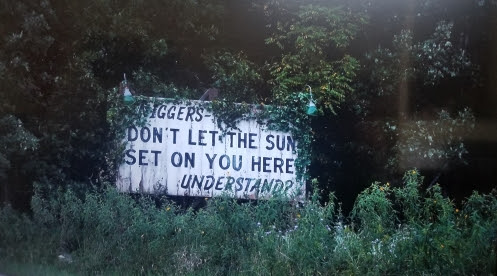
Scene from episode 1
Two years ago was the first time I’ve ever heard of a Sundown Town. No, not through a history book, but as a warning about staying too late in a little town in Texas that exists today! If I didn’t hear about this first hand, I would’ve thought it was a theme of the past, but no. There are currently county’s that do not condemn the abuse of black people once the sun goes down! While the billboard here might be a relic from the past, Sundown Towns are definitely alive and well across America!
10. White walls
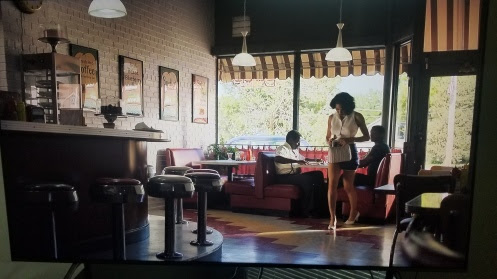
Scene from episode 1
Not only is this one telling, but it also holds all kinds of subliminal messages. While the group finds a Green book safe haven for dining called Lydia’s, they are surprised to find the restaurant is now called, Simmonsville Dinette. Still, they walk in and are greeted by unwelcoming faces. While the server goes to the back for what seems like their coffee orders, Atticus realizes that the walls are painted white. He asks his uncle to remind him why the white house was white. His uncle tells him about the war of 1812 when British soldiers torched it and when slaves were tasked to rebuild it, they had to paint it white to cover up the burn marks. This tells us two things. Lydia’s restaurant was burnt down and rebuilt by trespassers (obviously for being a safe haven for blacks in this all-white town) and the blackness of this restaurant was erased and covered up by the ‘white’ paint. My goodness, I could go on and on about this one!
I was expecting this series to be littered with easter eggs, but knowing they have incorporated easter eggs specifically about the black movement and struggles has me fired up to see what else is in store for these characters. Did you see any easter eggs that I missed? Comment and let me know.

